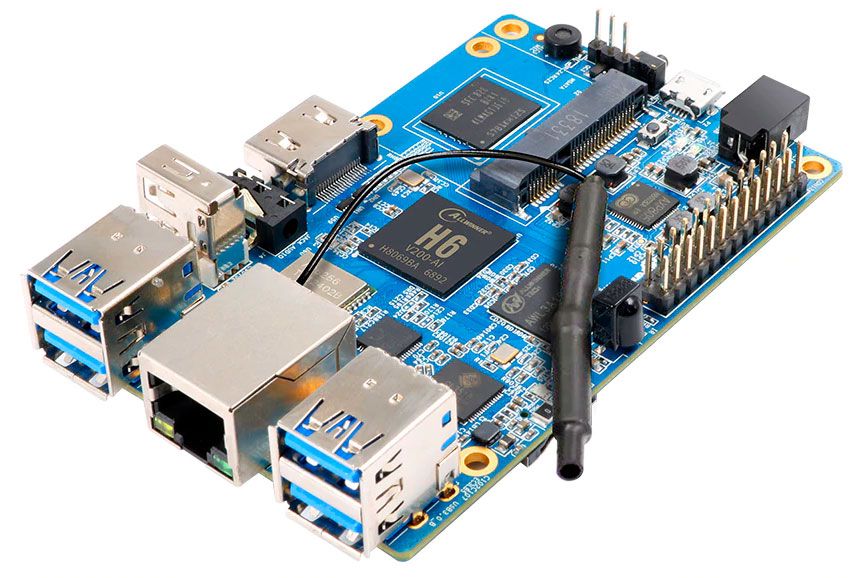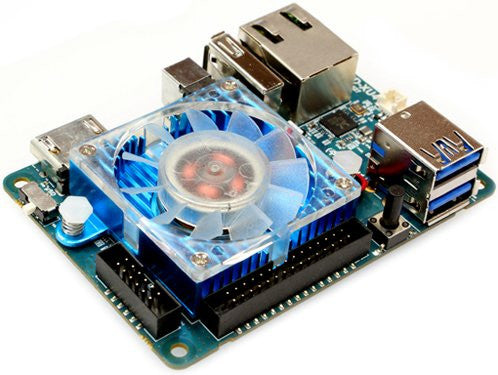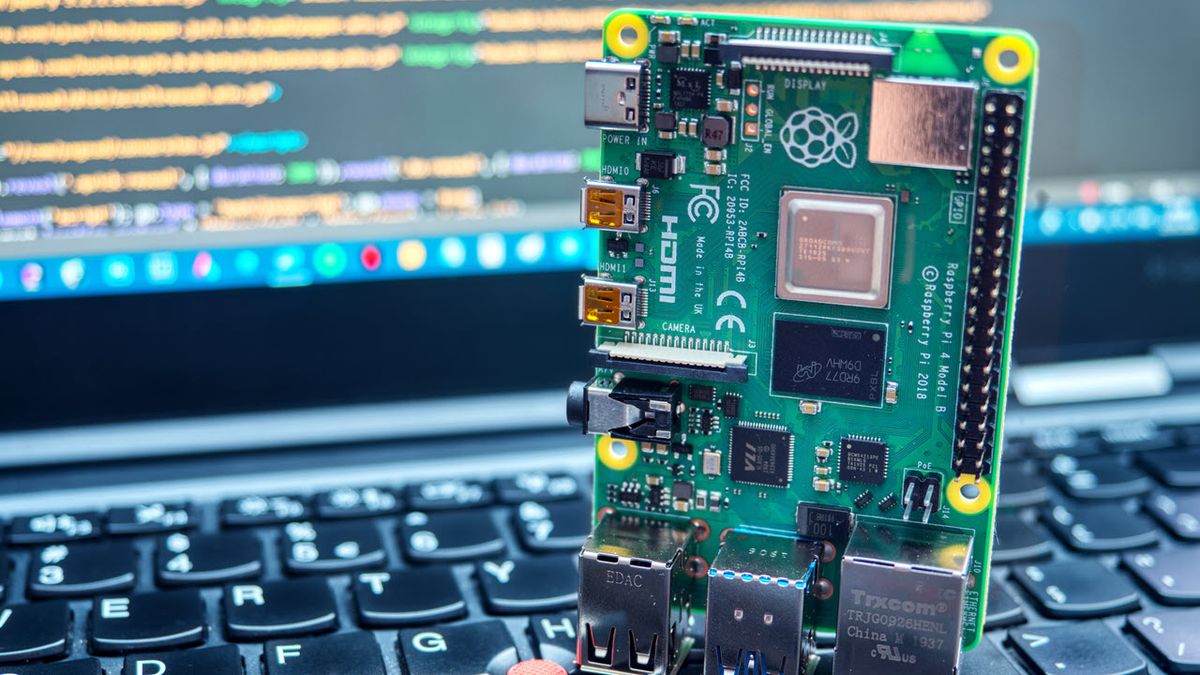Originally posted by brrrrttttt
View Post
Announcement
Collapse
No announcement yet.
Raspberry Pi Begins Rolling Out The Linux 4.19 Kernel
Collapse
X
-
I'm thinking along the lines of a new paradigm shift. For example what really small IoT did. We now have Nike's smart shoes, smart doorbells that are powered by your finger. You can also print flexible PCBs. So maybe RPi 4 could be built like a Lego house from small modular blocks?
-
rpi has never been about the newest cutting edge stuff. rpi is first and foremost about hitting a price point, specifically, 35 USD. you won't find any of the stuff you've described at that price point.Originally posted by caligula View PostI'm thinking along the lines of a new paradigm shift. For example what really small IoT did. We now have Nike's smart shoes, smart doorbells that are powered by your finger. You can also print flexible PCBs. So maybe RPi 4 could be built like a Lego house from small modular blocks?
Comment
-
@ 24
Originally posted by tweak42 View Post
Thank you very much, from everyone here and elsewhere.
This is exactly the kind of assistance we all need in order to sort out the wheat from the (fanbois') chaff.
It seems, coming from Eben Upton himself, that a 'Raspberry Pi 4' will not happen before 2020, and, reading between the lines, that its characteristics will be seriously hobbled--compared to what is available right now--by the Raspberry Pi Group's own self-imposed constraints.
To read about small sample (three) of products available now, see
Orange Pi ($34.90-$39.90; 2 G RAM, 8 GB eMMC)--
 Shenzhen Xunlong Software has launched its Orange Pi 3 development board to compete against the Raspberry Pi 3.
Shenzhen Xunlong Software has launched its Orange Pi 3 development board to compete against the Raspberry Pi 3.
Odroid N2 (1.8 GHz; 2-4 GB DDR4 RAM; 12 nm silicon; $63-$79) --
Odroid XU-4 ($51.95; 8-core, 1.5 GHz; 2 GB RAM)--
 ODROID-XU4Q Also consider the ODROID-XU4Q which has a passive heatsink Check our Home Assistant Bundle ODROID-XU4 Check our Home Assistant Bundle ODROID-XU4Q Big power in a small package! The ODROID-XU4 packs an octa-core Heterogeneous Multi-Processing ARM CPU, 2GB of high-speed RAM, 2x full-sized USB3.0 ports, Gigabit
ODROID-XU4Q Also consider the ODROID-XU4Q which has a passive heatsink Check our Home Assistant Bundle ODROID-XU4 Check our Home Assistant Bundle ODROID-XU4Q Big power in a small package! The ODROID-XU4 packs an octa-core Heterogeneous Multi-Processing ARM CPU, 2GB of high-speed RAM, 2x full-sized USB3.0 ports, Gigabit
These three devices range from $35 to $70, have real Gigabit Ethernet; and have, at a minimum and maximum, 2 GB of RAM, and up to 128 GB of eMMC (and a whole lot more, including a real on-off switch; read for yourself). AND represent only three of the flood of devices available right this moment.
And please, all you fanboises, don't regale us with all your "...yeah, BUT..." [supposedly valuable] rejoinders. This type information has value if for no other reason than demonstrating what the rest of the industry is not only capable of, but doing right this moment...and, fortunately or unfortunately, pointing out the shortcomings of what some people might be emotionally tied to.
Comment
-
Also the software support and guaranteed manufacture availability for YEARS. The fact that you can run current version of Raspbian on RasPi that shipped 6 years ago, really underscores the Foundation's aim for the long haul, instead of the "toss out last years" and "build what's HOT this year" mentality.Originally posted by torsionbar28 View Postrpi has never been about the newest cutting edge stuff. rpi is first and foremost about hitting a price point, specifically, 35 USD. you won't find any of the stuff you've described at that price point.
Eben does touch on the fact that $35 6 years ago is about $38 today due to inflation, so hopefully they can still keep the price at $35.
- Likes 1
Comment
-
I think if a board becomes supported by the mainline kernel, there will be years of support. Consider x86 hardware. They can easily support hardware up to 6 years. They're only now discussing deprecation of 12-15 year old hardware (32-bit x86). GPUs from early 2000s are still supported. There's even support for IDE hard drives and ISA cards.Originally posted by tweak42 View Post
Also the software support and guaranteed manufacture availability for YEARS. The fact that you can run current version of Raspbian on RasPi that shipped 6 years ago, really underscores the Foundation's aim for the long haul, instead of the "toss out last years" and "build what's HOT this year" mentality.
The ARM support is a bit different. It annoys me that Raspbian decided to pick support for ARMv6 binaries, not ARMv7. The 64bit support wasn't really fully usable when it appeared. ARMv7 would have been a more stable interface. Other distros also seem to support ARMv7 much better than ARMv6, even the compiler support is better. The hardware support is great though. It's nice to know you can still order compatible boards. Apparently NanoPi also offers some LTS boards, but I still suspect the RPi support is better.
Comment
-
Michael Larabel wrote a very comprehensive six-page article on the Odroid XU-4 on 11 December, with 33 comments [the only change is that the price has now dropped to $51.95) --
"ODROID-XU4: Much Better Performance Than The Raspberry Pi Plus USB3 & Gigabit Ethernet @ $60"
 Phoronix, Linux Hardware Reviews, Linux hardware benchmarks, Linux server benchmarks, Linux benchmarking, Desktop Linux, Linux performance, Open Source graphics, Linux How To, Ubuntu benchmarks, Ubuntu hardware, Phoronix Test Suite
Phoronix, Linux Hardware Reviews, Linux hardware benchmarks, Linux server benchmarks, Linux benchmarking, Desktop Linux, Linux performance, Open Source graphics, Linux How To, Ubuntu benchmarks, Ubuntu hardware, Phoronix Test Suite
From the first page--
”...My testing was using the Ubuntu 18.04 image with the Linux 4.14.37 kernel and it uses the GCC 7.3 compiler by default. For getting an idea about the performance capabilities of this ARM SBC I benchmarked it up against the ASUS Tinker Board, Raspberry Pi 3 Model A+, Raspberry Pi 3 Model B+, Jetson TX1, Jetson TX2, ODROID C1 Plus, ALL-H3-CC H5 2GB, and AML-S905X-CC 2GB. All of these ARM Linux benchmarks were carried out using the Phoronix Test Suite...”
Comment
-
There is much more to *actually* supporting hardware than just shipping something in a mainline kernel. Just because some board is supported by mainline doesn't mean it's well supported (i.e. most or all relevant pieces of hardware work) or that it's free of critical bugs. Kernel support also does not ensure at all that possibly required userspace bits (open source or not) are in good shape and usable. TL;DR mainline kernel support is not the gold standard. By itself it doesn't necessarily mean much.Originally posted by caligula View Post
I think if a board becomes supported by the mainline kernel, there will be years of support. Consider x86 hardware. They can easily support hardware up to 6 years. They're only now discussing deprecation of 12-15 year old hardware (32-bit x86). GPUs from early 2000s are still supported. There's even support for IDE hard drives and ISA cards.
Raspberry Pi Ltd. actually maintains a complete software stack and they make sure everything works correctly. They track LTS kernels and Debian stable releases. They've done so for the last 6 years or so, which is quite impressive. And there's no sign that they'll stop any time soon.
No other vendor of SBCs has come anywhere close to this.
It's super obvious why they stick to ARMv6, to support first-gen Raspberry Pi boards. If you want performance, you can compile against ARMv7 and also use NEON etc. on Raspberry Pi 2/3 boards. In most cases it doesn't matter that glibc etc. are only compiled against ARMv6. This is good enough in practice IMHO.
The ARM support is a bit different. It annoys me that Raspbian decided to pick support for ARMv6 binaries, not ARMv7. The 64bit support wasn't really fully usable when it appeared. ARMv7 would have been a more stable interface. Other distros also seem to support ARMv7 much better than ARMv6, even the compiler support is better. The hardware support is great though. It's nice to know you can still order compatible boards. Apparently NanoPi also offers some LTS boards, but I still suspect the RPi support is better.
- Likes 2
Comment
-
@ 34--
"...Eben does touch on the fact that $35 6 years ago is about $38 today due to inflation, so hopefully they can still keep the price at $35." ...
...and in 2020, IF that's when the RPi4 hits, that $35 will be about $42. Keeping the street price at $35 means you get even less than you get now.
Not sure I understand the logic here. One can price the product anywhere along the spectrum one wants . The trick is to not lose money while maintaining competitiveness. I, for one, would love to see the RPi equivalent of the $51.95 Odroid XU-4 for $35.00.
Read the specs again at http://www.phoronix.com/vr.php?view=27226
It'll never happen.
Comment


Comment